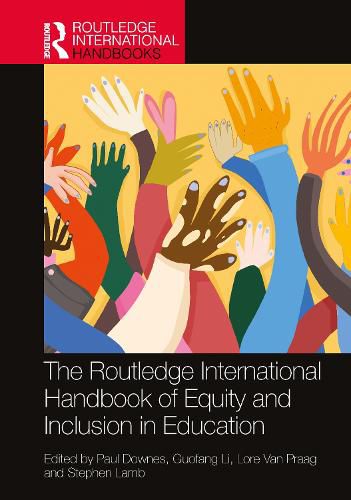Readings Newsletter
Become a Readings Member to make your shopping experience even easier.
Sign in or sign up for free!






Providing a cornerstone to the global debate on equity and inclusion within education, this handbook explores equity issues pertaining to poverty and social class, race, ethnicity, sociocultural, sociolinguistic exclusion in education and recognises intersectionality and gender across these dimensions.
This carefully curated collection of essays written by international experts promotes inclusive systems in education that explicitly recognise the voices of learners who may be at risk of marginalisation, exclusion or underachievement. Developing a multilayered innovative conceptual framework involving spatial, emotional-relational and dialogical 'turns' for education, it emphasises key system points for reform, including building strategic bridges between health and education for vulnerable groups and shifts in focus for initial teacher education and the wider curriculum.
The handbook is organised into the following key parts:
Theoretical Frameworks Funding Models and Structures for Equity and Inclusive Systems Exclusion and Discrimination Bridging Health and Education Agency and Empowerment Outreach and Engagement
The Routledge International Handbook of Equity and Inclusion in Education will be of great value to academics operating in the areas of education, psychology, sociology, social policy, ethnography, cultural studies; researchers in university research centres and in policy institutes pertaining to education, poverty, social inclusion as well as international organisations involved with inclusion in education.
$9.00 standard shipping within Australia
FREE standard shipping within Australia for orders over $100.00
Express & International shipping calculated at checkout
Providing a cornerstone to the global debate on equity and inclusion within education, this handbook explores equity issues pertaining to poverty and social class, race, ethnicity, sociocultural, sociolinguistic exclusion in education and recognises intersectionality and gender across these dimensions.
This carefully curated collection of essays written by international experts promotes inclusive systems in education that explicitly recognise the voices of learners who may be at risk of marginalisation, exclusion or underachievement. Developing a multilayered innovative conceptual framework involving spatial, emotional-relational and dialogical 'turns' for education, it emphasises key system points for reform, including building strategic bridges between health and education for vulnerable groups and shifts in focus for initial teacher education and the wider curriculum.
The handbook is organised into the following key parts:
Theoretical Frameworks Funding Models and Structures for Equity and Inclusive Systems Exclusion and Discrimination Bridging Health and Education Agency and Empowerment Outreach and Engagement
The Routledge International Handbook of Equity and Inclusion in Education will be of great value to academics operating in the areas of education, psychology, sociology, social policy, ethnography, cultural studies; researchers in university research centres and in policy institutes pertaining to education, poverty, social inclusion as well as international organisations involved with inclusion in education.